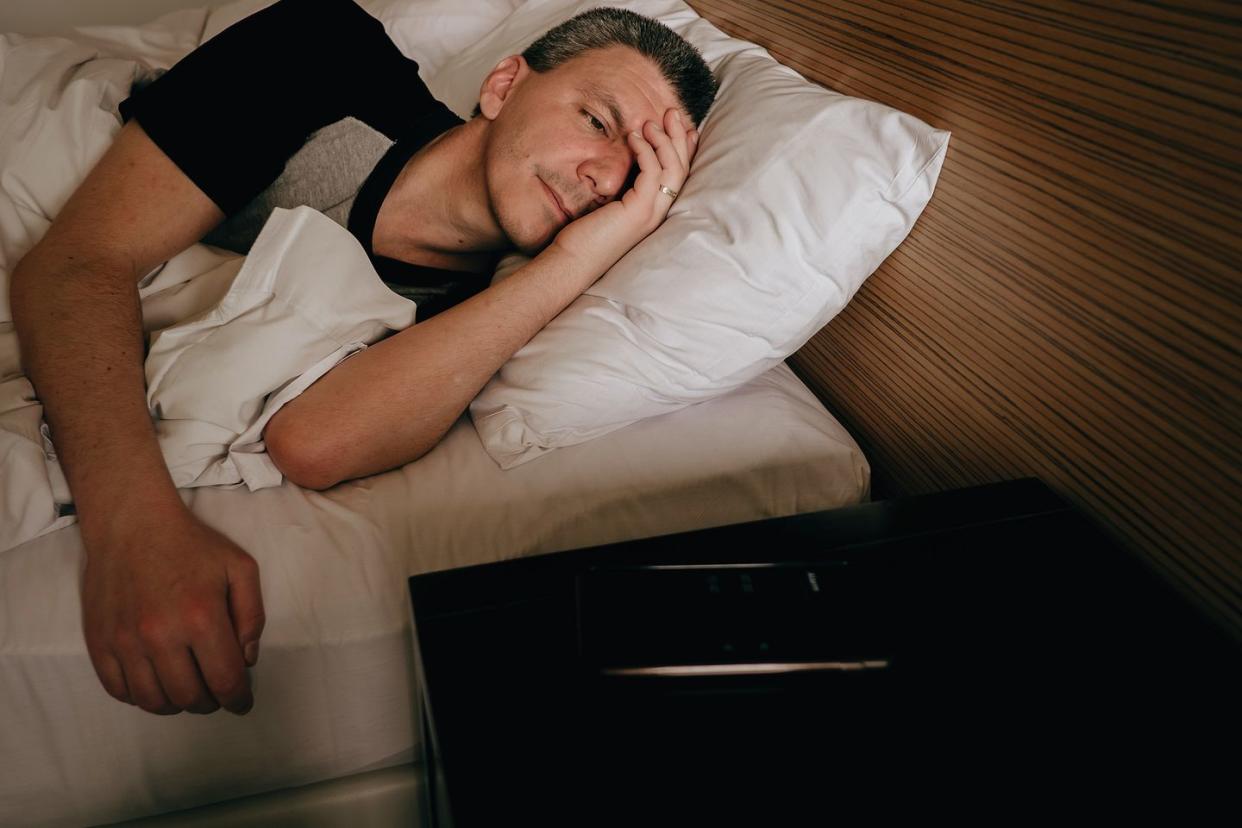Sleep Coaching vs. Sleep Therapy—Doctors Explain Which Is Most Beneficial

TOSSING AND TURNING because of stress, bad dreams, and 2 a.m. bathroom breaks are all things that keep you from getting a good night’s sleep. So can snoring, having irregular breathing patterns, or feeling like you need to move as soon as you doze off. When you're going through life bleary eyed, you might seek out a sleep coach to help you get some rest.
“Sleep coaching is a broad term,” explains Rakesh Bhattacharjee, M.D., a spokesperson for the American Academy of Sleep Medicine. “It doesn’t have an overseeing body or code of ethics, meaning they are more of a consultant that can provide support, advice, or education about sleep.”
If you have a sleep disorder, sleep coaches can’t make an official diagnosis of a sleep disorder or prescribe treatment, Dr. Bhattacharjee says. Usually, a better way to improve your sleep is with sleep therapy under the guidance of a physician who specializes in sleep.
About a third of American adults don’t get the recommended seven to nine hours of sleep a night, according to the Centers for Disease Control and Prevention. This can increase the risk for many different health conditions, like heart disease, stroke, obesity, and depression. So, taking steps to solve your sleep problems is crucial.
Most people who don’t regularly get enough sleep likely have a sleep disorder, such as insomnia or restless leg syndrome, or a problem like depression or anxiety, says Eric Yeh, M.D., a sleep medicine physician at University Hospitals in Cleveland, Ohio.
While these individuals could benefit from some aspects of sleep coaching, Dr. Yeh says they usually need a specific treatment, such as cognitive behavioral therapy or medication, which can only be provided by a trained and certified medical professional.
What’s the difference between sleep coaching and sleep therapy?
Sleep coaching is often associated with sleep training for babies, where parents receive education, support, and advice for improving their child’s sleep, Dr. Yeh says. However, sleep coaches also work with adults in the same vein.

A sleep coach can help people with non-medical aspects of sleep issues, says Alex Dimitriu, M.D., a board-certified physician in psychiatry and sleep medicine and founder of Menlo Park Psychiatry and Sleep Medicine. This might include suggesting changes to a sleep environment and holding people accountable for following the recommendations. But, they can’t diagnose sleep disorders or prescribe treatments—which you might need to solve your sleep problems.
But, he adds, “It’s not hard these days for anyone to call themselves a ‘coach’ in various fields.”
The Society of Behavioral Sleep Medicine actually urges caution when using a sleep coach, as there are no specific training requirements or regulatory bodies that oversee their work. Instead, the organization recommends working with a licensed physician or mental health professional with experience in sleep.
A sleep specialist is a physician who’s board-certified to diagnose sleep disorders, including sleep apnea, insomnia, or restless leg syndrome, and prescribe treatments, Dr. Yeh says. Sleep therapy can treat these conditions using medications, behavior modifications, mental health treatment, and other therapies, depending on the specific condition.
Who needs sleep coaching or sleep therapy?
Anyone who struggles to get restful sleep most nights or has concerns about their sleep can benefit from sleep therapy, Dr. Bhattacharjee says. Start by talking to your primary care physician, who can make a referral for a sleep study. The American Academy of Sleep Medicine also has an online tool to find a local sleep specialist.
People often worry about what is and isn’t normal about their sleep, Dr. Yeh says. “Having a consultation with a sleep medicine specialist is always beneficial—maybe even if it’s just for reassurance.”
What Sleep Therapy Involves
When you see a sleep specialist, they’ll discuss your medical history and ask a series of questions about your sleep, like how much you sleep, whether falling asleep is difficult, if you wake up during the night, and if you feel rested during the day, Dr. Yeh says.

Sleep disorders have specific diagnostic criteria that doctors look for, he adds, and the exact treatment varies depending on the sleep problem. For example, people with sleep apnea may need a CPAP machine, sleep aids may be needed for insomnia, and other medications are prescribed for narcolepsy or restless leg syndrome.
Cognitive behavioral therapy for insomnia might also be recommended, Dr. Dimitriu says. This typically involves sleep restriction therapy to help ensure you’re asleep 80 percent of the time you’re in bed, stimulus control therapy to establish the relationship that your bed is just for sleeping and sex, and cognitive therapy to dive into your beliefs about sleep.
Sleep hygiene is another key part of sleep therapy. This can include recommending new habits, such as cutting off caffeine at a certain time every day, avoiding naps, putting your phone away before bedtime, and establishing a bedtime routine.
Eating a healthy diet and getting more exercise can improve sleep, too, Dr. Dimitriu says. “I tell my patients they need to be more vertical during the day to sleep better horizontally at night.”
In sleep therapy, you might also be asked to keep a sleep log to track your progress, he adds.
How long does it take to work?
Everyone and their sleep issues are unique, so there’s no set timeline for seeing results, Dr. Bhattacharjee.
Some people might start seeing improvements within a few weeks, Dr. Dimitriu. It might take several months or years for others, Dr. Yeh adds.
The effectiveness of sleep therapy often depends on the individual’s “level of execution,” or how well you follow a sleep specialist’s recommendations and treatments, Dr. Yeh says.
“A lot of this is behavioral changes and behavioral changes require motivation, require buy-in, and require a good relationship between the provider and the patient,” he adds.
You Might Also Like
